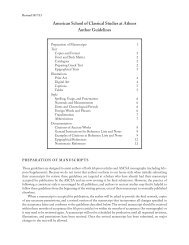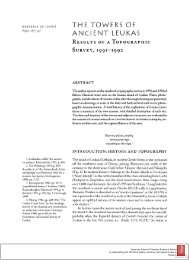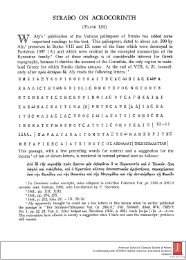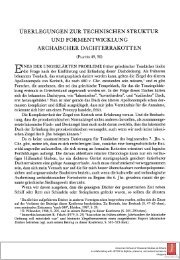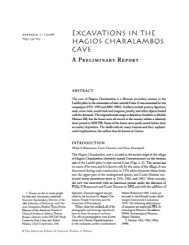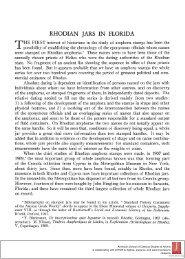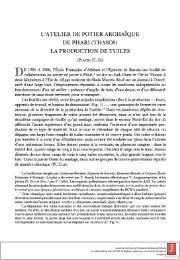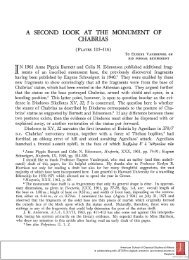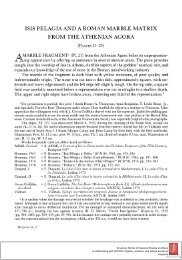the attic stelai - The American School of Classical Studies at Athens
the attic stelai - The American School of Classical Studies at Athens
the attic stelai - The American School of Classical Studies at Athens
You also want an ePaper? Increase the reach of your titles
YUMPU automatically turns print PDFs into web optimized ePapers that Google loves.
310 W. KENDRICK PRITCHETT<br />
effect th<strong>at</strong> several handfuls <strong>of</strong> barley (-sheaves) were bound toge<strong>the</strong>r into a single<br />
desme.8 Similarly, A<strong>the</strong>naeus elsewhere refers to a desme <strong>of</strong> split wood;' Alexis<br />
refers to 'bundles' <strong>of</strong> thyme;'10 and Dionysios <strong>of</strong> Halikarnassos (III, 61) to a<br />
'bundle' <strong>of</strong> rods. Hesychius defines d7KaAX8Es, 'armfuls,' as desmai <strong>of</strong> firewood."<br />
<strong>The</strong> word was widely used in Egypt for 'bundles' <strong>of</strong> hay and straw; see <strong>the</strong> papyrological<br />
references in A. C. Johnson,, "Roman Egypt," Economic Survey, II, pp.<br />
470-471.<br />
In II, 151, <strong>the</strong> word desme is followed by a sigma. <strong>The</strong> remaining letters <strong>of</strong> <strong>the</strong><br />
word are lost, and <strong>the</strong> item was left uncompleted in Part I. Since <strong>the</strong>re are references<br />
to desmai <strong>of</strong> coriander, <strong>of</strong> whe<strong>at</strong>, <strong>of</strong> barley,'2 one likely restor<strong>at</strong>ion would be <strong>the</strong> word<br />
o- ['iyrao6ov]. <strong>The</strong> entry would presumably refer to sesame-sheaves. Ano<strong>the</strong>r possibility<br />
might be <strong>the</strong> word a-[aKKiV]. [Demos<strong>the</strong>nes] XXXV, Against Lakritos, 34, contains<br />
a reference to desmai <strong>of</strong> skins, and by analogy desme <strong>of</strong> sakkoi would refer to a bundle<br />
<strong>of</strong> cloth bags or sacks.<br />
4. EKXaXK&jta (VI, 86). Bronze objects. <strong>The</strong> word occurs only in our inscription.<br />
<strong>The</strong> first five letters are preserved; <strong>the</strong> remainder has been completed according<br />
to <strong>the</strong> suggestion <strong>of</strong> Tod in Hermca<strong>the</strong>na, LIX, 1942, p. 82. <strong>The</strong> simplex is used for<br />
any bronze vessel or instrument, including bronze tablets for tre<strong>at</strong>ies 13 and a metal<br />
breastpl<strong>at</strong>e."4 <strong>The</strong> diminutive <strong>of</strong> <strong>the</strong> simplex, chalkom<strong>at</strong>ion, is used in Insc. Delos,<br />
1417, A, col. I, line 104, for ten objects which were contained in a small box. <strong>The</strong><br />
reference in our inscription may well be to similar small objects, for <strong>the</strong> price is given<br />
as 52 drachmas, approxim<strong>at</strong>ely one fourth <strong>of</strong> <strong>the</strong> value <strong>of</strong> <strong>the</strong> bronze obelos <strong>of</strong> I, 95.<br />
5. EITLKapM<strong>at</strong>J (I, 20, 22, 29; II, 81, 97, 178; VIII, 5; X, 11, 31[?]). Crop. A<br />
precise definition <strong>of</strong> this word in our context is difficult. It first occurs in <strong>the</strong> Gortyniani<br />
Laws (ca. 450 B.C.)"5 in connection with <strong>the</strong> rights <strong>of</strong> heiresses and bears <strong>the</strong> general<br />
meaning <strong>of</strong> ' revenue ' or ' income ' <strong>of</strong> all <strong>the</strong> property. This seems to be <strong>the</strong> meaning<br />
also in its earliest literary use, in 'Andokides I, 92. However, Holleaux, in publishing<br />
an inscription from <strong>The</strong>spiai, noted th<strong>at</strong> <strong>the</strong> meaning <strong>of</strong> epikarpia was <strong>the</strong>re " recolte<br />
sur pied dans le moment oiu la vente a lieu."'y He gave references to <strong>the</strong> Attic<br />
Stelai for a similar meaning. <strong>The</strong> definition <strong>of</strong> 'crops not yet reaped' has subsequently<br />
been accepted for epikarpia in our inscriptions, for example, by Kirchner,"<br />
8 XIV, 618d (== F.H.G., IV, 495).<br />
9XV, 700 b.<br />
10 Frag. 117: Kock, C.A.F., II, p. 339.<br />
11 Cf. Pollux, II, 139.<br />
12<br />
See <strong>The</strong>saurus Graecae Linguae, s.v.<br />
'3 Polybios, III, 26, 1.<br />
14<br />
Polybios, VI, 23, 14.<br />
15 InscriPtiones Creticae, IV, Rome, 1950, 70, col. VII, line 33.<br />
"6 R.E.G., X, 1897, p. 36. Cf. also Ziebarth, Wochenschr. klass. Phil., XIV, 1897, 1026.<br />
17 Ad Syll.3, 96, note.



